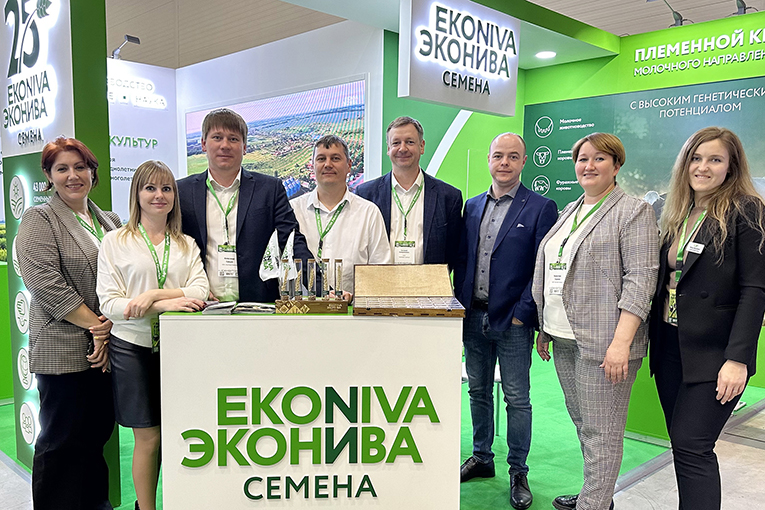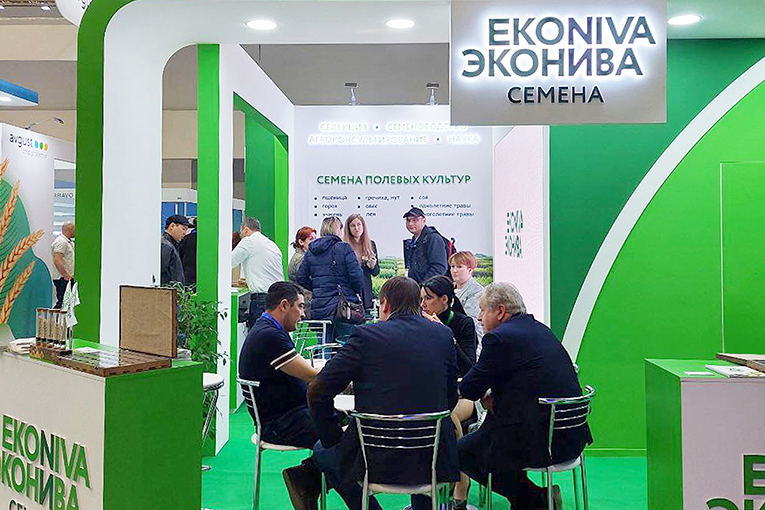EkoNiva steps up cooperation with Kazakh farmers
Press-centre / News,
EkoNiva Group has taken part in the AgriTek/FarmTek Astana 2023 international trade show in Kazakhstan. Over three days, the holding has had about 200 business meetings with local agricultural producers at its booth and reached a number of mutually beneficial agreements.

Farming events in Kazakhstan always attract plenty of participants and visitors willing to present their products and build up business contacts. This year’s geography of AgriTek/FarmTek Astana was broader than ever, with about 50 countries and 225 exhibiting companies. EkoNiva showcased pedigree dairy cattle and a wide range of premium seeds with high genetic potential, including crop varieties adapted to the climatic conditions of Kazakhstan.
The Group has been supplying seeds to the country since 2014, during which time the sales have increased tenfold. Last year, over four thousand tonnes of seeds were provided to local farmers. Throughout its partnership with the republic, EkoNiva-Semena has realised more than 21,000 tonnes of seeds of spring and winter crops, annual and perennial grasses. The company has over 600 clients now, and the number will continue to rise.
‘Thanks to EkoNiva's ongoing cooperation and participation in major trade shows and field events, our seeds enjoy immense popularity in Kazakhstan. It is one of the key export destinations for us. We keep on developing our presence here to increase our customer base and supply volumes. Today, EkoNiva-Semena has a rich variety portfolio having something to offer for each of the regions with regard to the natural and climatic characteristics and individual needs. Excellent production performance and positive feedback from Kazakh farmers show the high effectiveness our cooperation. We are grateful to all the partners who visited EkoNiva's booth at AgriTek/FarmTek Astana and will be happy to meet them again in Russia and Kazakhstan’, says Yevgeniy Kucheryavenko, Executive Director of EkoNiva-Semena.
Plastic varieties with high adaptive and other valuable properties come out on top in the republic’s farming sector. Priority is given to three main characteristics: consistent quality yields, productive tillering coefficient and drought resistance. Spring crops such as wheat and barley make up the bulk of EkoNiva's seed exports to Kazakhstan. There is also demand for winter wheat, oats, peas, lentils and soya beans.

The average yield of EkoNiva's cereals exceeds 5 tonnes per hectare, with the proper technology and sufficient moisture ensured, and in the regions with an arid climate the output is about 3 tonnes per hectare. This is 25-30% more compared to the yields of other varieties.
EkoNiva's in-house bred varieties are also gaining momentum in Kazakhstan – they have already received first good feedback. Dastan farm, Aktobe oblast in the western part of the country, harvested a bumper crop of winter wheat last season.
‘We sowed the EN Cepheus variety for the first time in autumn 2021 on an area of 1,000 hectares and were perfectly content with the result: a high gluten level, excellent natural weight and, above all, a yield of 6.8 tonnes per hectare. This is almost twice as much as the other varieties. Last year, when we planted EN Cepheus again, it overwintered well and now shows good germination, so this season is going to bring a rich harvest too’, says Manarbek Sagitov, Chief Agronomist of Dastan.
Recently, the country has seen active development of livestock farming, and there is a rising demand for perennial forage grasses suitable for growing in a dry climate. Of special interest to Kazakhs are alfalfa, wheatgrass and sainfoin.
EkoNiva’s heifers are also sought-after among the local farmers. The company has been keeping pedigree cattle adapted to commercial environment for over fifteen years. Particular attention is paid to breeding and genetic improvement of animals: milk fat and protein, conformation, health and development of each cow are under strict control. The Group's dairy heifers have already proved their worth on Russia's largest farms.